Sunday, November 17, 2024 05:29 AM
Reading Culture and Tolerance in Pakistan
- Reading fosters tolerance and open-mindedness.
- Urdu literature needs revival among youth.
- Historical figures exemplified knowledge and tolerance.
 Image Credits: thefridaytimes
Image Credits: thefridaytimesExploring the link between reading culture and tolerance in Pakistan, emphasizing the need for literary revival.
The relationship between a culture of reading and an atmosphere of tolerance is a topic that deserves our attention. In many societies, the act of reading is not just a pastime; it is a pathway to development and progress. Cultures that prioritize learning and knowledge often find themselves more prosperous and open-minded. This connection raises an important question: can fostering a love for reading also cultivate a more tolerant society?
Reading has been a lifelong passion for many, and it opens doors to new ideas and perspectives. For instance, the classic book "Walden" by Henry David Thoreau invites readers to reflect on nature and solitude. In a world increasingly affected by global warming, reconnecting with nature through literature can be a vital step towards awareness and action. However, the sheer volume of books available can be overwhelming, leading to a sense of urgency to read as much as possible before time runs out.
Literature has the power to make sense of the human experience. The works of Anton Chekhov, for example, provide profound insights into the human condition through simple yet powerful storytelling. Similarly, the short stories of Saadat Hasan Manto resonate deeply within Pakistani culture, as he bravely addressed societal issues without sugarcoating the harsh realities. Manto's defiance against censorship serves as a reminder that imposing morality on others stifles creativity and expression.
Exploring historical fiction, such as "Zuleikha" by Guzel Yakhina, allows readers to learn about significant events like the Russian Revolution while being captivated by a fictional narrative. This genre not only entertains but also educates, bridging the gap between past and present. Additionally, the enchanting series "The Cemetery of the Forgotten Books" transports readers to the tumultuous times of the Spanish Civil War, offering an escape from the daily grind.
Reflecting on childhood reading experiences, many can recall the joy of immersing themselves in Urdu literature, such as the "Amir Hamza" and "Umroo Ayar" series. These stories not only entertained but also instilled a love for reading that lasts a lifetime. However, the decline in Urdu reading among the youth is concerning, and there is a pressing need to revive this passion. Authors like Arshad Mahmood, who address contemporary societal issues, can play a crucial role in this revival.
Historically, figures like Al-Mamun, the Abbasid caliph, exemplified the importance of knowledge and tolerance. His establishment of the House of Wisdom in Baghdad fostered an environment where scholars from diverse backgrounds could thrive. This openness led to significant advancements in science and culture, marking a golden age for the Islamic world. Today, Pakistan can draw inspiration from this legacy by promoting a culture that values learning and embraces diverse ideas.
The urgency for Pakistan to cultivate a tolerant society that cherishes knowledge cannot be overstated. Encouraging reading among citizens, perhaps by designating a National Reading Month, could be a step in the right direction. By sharing their reading experiences, politicians can also inspire the public to engage with literature. Ultimately, fostering a culture of reading not only enriches individual lives but also strengthens the fabric of society, paving the way for a more open and understanding world.













